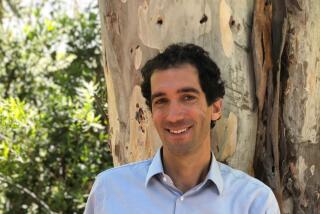Dream Won’t Be Grounded
In Ray Bradbury’s short story “Rocket Man,” the young son of a spaceship pilot recounts how he would affectionately collect the colorful stardust that lingered on the flight suit of his often-absent father. In an image that fuses the life, loss and technology of the story, the boy notices during a rare car trip with his dad that dozens of brilliantly colored butterflies are trapped and dying in the grille of the family car.
Bradbury’s tale -- about the fragility of splendor, the loneliness of achievement and the persistence of love despite distance -- echoes in the story of David Roy, a 17-year-old from South Los Angeles who learned to build rockets from his father, then kept at it when his dad died two years ago of cancer. He designed a 7-foot-tall rocket called Vertigo that could reach speeds of up to 705 mph and an altitude of 35,000 feet.
As Times staff writer Jocelyn Y. Stewart recently reported, Roy was to have brought Vertigo to a national academic competition in Miami, but the rocket was stolen the night before the competition began by burglars who also took his family’s VCR and CD player.
Some will argue that it’s absurd to draw meaning from the burglary. The thieves, after all, were trying to steal goods, not dreams.
Indeed, another point of Bradbury’s story was that technology is not a thing unto itself: It can be a tool for accomplishment, a magnet for crime or a trap for bugs.
Roy left for Miami anyway and unlike the 100 or so other contestants in the science competition hall who competed using models, he had only a three-sided cardboard display with photographs, equations and an explanation. He didn’t win, but his return to Los Angeles was not without triumph.
Such persistence despite loss is a slap to the thieves, showing the worthlessness of stolen goods when compared with Roy’s dreams.
More to Read
Sign up for our Book Club newsletter
Get the latest news, events and more from the Los Angeles Times Book Club, and help us get L.A. reading and talking.
You may occasionally receive promotional content from the Los Angeles Times.






